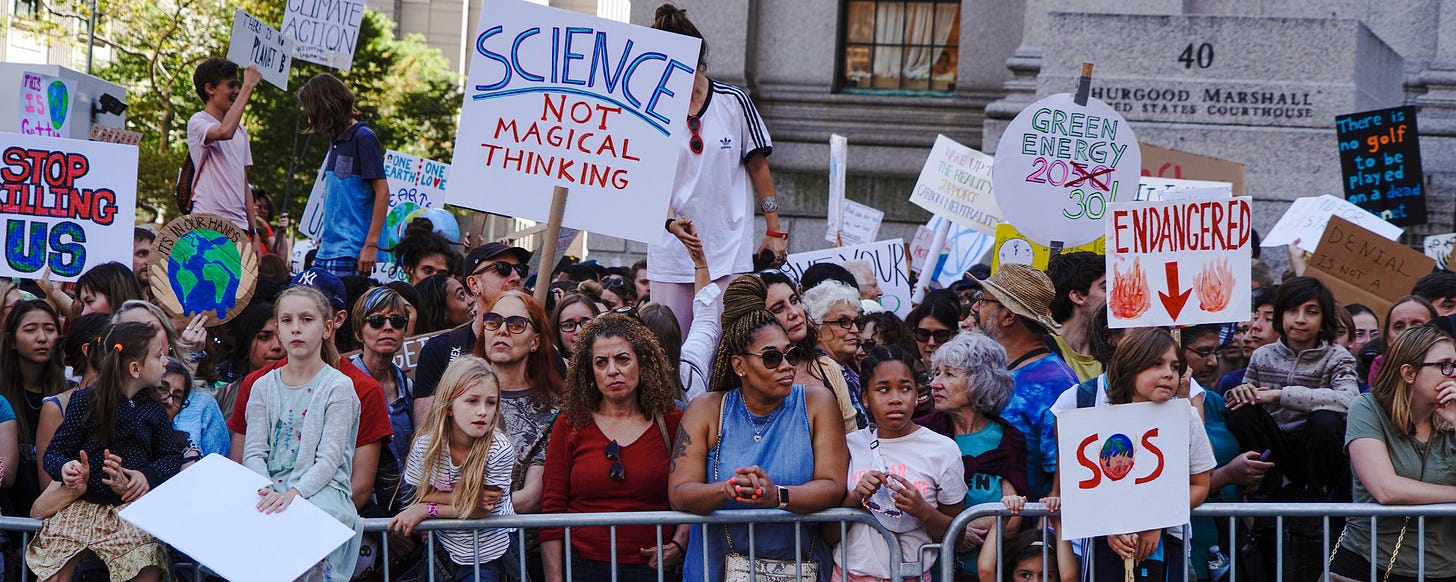Renee Lertzman on climate anxiety - guest edition
Psychologist Renee Lertzman on dealing with climate anxiety and encouraging climate action
Wildfires have raged across Canada the last few weeks, covering huge areas of eastern Canada and the U.S. in thick, apocalyptic orange haze. Even if you aren’t breathing record levels of particulates in cities like New York, Toronto, or Washington D.C., you might still be feeling existential dread just from seeing images of the smoke-filled orange skies as the Northern Hemisphere heads into what's likely to be another scorching summer.
It’s fitting, then, that my first-ever guest edited newsletter this week is hosted by psychologist Renee Lertzman. Renee’s work is all about understanding the emotional impact of the global climate crisis, and how to turn climate anxiety into action. She believes that her job is not to motivate or “get people to care” about the problems facing the planet, but to listen to them and guide them towards action.
That’s why she developed Project Inside Out, an online tool and resource hub that brings together change-makers, activists, and clinical psychologists to drive sustainable behavioral change on climate issues. Renee says that the psychology of climate change is not only about how we manage our mental health as we face this crisis, it’s also about how we help others take action too.
Take it away, Renee!
GOOD NEWS
Sixteen young Montanans who range in age from 5 to 22 are suing the state, claiming that its support of fossil fuels violates the state constitution, which guarantees a right to a “clean and healthful environment in Montana for present and all future generations.” Despite efforts to derail the lawsuit, a judge recently ruled it can go to trial, which will make it the first of its kind in the U.S.
“It’s so powerful to see younger people seeking action on climate commensurate with the scale of what’s at stake,” Renee says. “This is truly next-level human behavior. It requires what Buddhist teaching calls “skillful means” — where we channel our commitment and dedication from a place of love, compassion, and connection instead of fear, blame, shame, accusation, or demonization.”
“We need to celebrate this,” she continues, “and together, dive deeper into how more of us can step into compassionate leadership roles, no matter who or where you are, or your political affiliation or ideology. This is an all-hands-on-deck moment, and these young people are embodying a new kind of leadership for us all.” I couldn’t agree more!
NOT-SO-GOOD NEWS
Biologists have discovered more than 5,000 new species at a future deep-sea mining site in the Pacific Ocean. The site — which is about twice the size of India and stretches from Mexico to Hawaii — has already been carved up into mining claims by companies hoping to extract materials like manganese, cobalt, and nickel located some 4,000 to 6,000 meters below the surface.
These rare earth minerals are key to producing the batteries for the current technology that enables the world to swap fossil fuel power for emissions-free alternative energy. There are other places they can be mined, though, and these come at a cost that have led some to call for a ban on deep sea mining, warning of potentially disastrous effects on the ocean’s ecosystem.
“There is a profound shadow world to the renewable energy tech markets and what we consider to be “solutions” in energy transition,” Renee says. “Much life is at stake, and it is hard for us to process this emotionally and cognitively, especially if we are focused on short-term survival. This kind of news can send one into a very dark hole of despair and hopelessness.” That’s exactly why this next section is so important!
WHAT YOU CAN DO
Where to begin? Renee’s top recommendation is to start a conversation with someone in your life about climate action. But don’t lecture them or dump your worries on them. Instead, she says, focus mainly on asking questions and listening. Notice your own triggers and reactivity as you practice staying open and curious. Keep in mind the existential magnitude of our situation and how we are all navigating complex challenges.
What we need now are honest, grounded and compassionate conversations across diverse perspectives, so we can truly listen and find common ground. The ability to have conversations and group discussions that are productive and “safe” is the baseline for climate action.
If you’d like to reflect on your own style as an advocate, check out the Changemaker Quiz on Project InsideOut. Are you a cheerleader, a “righter,” an educator, or a guide?
CONCLUSION
A big thank you to Renee for curating this week’s edition of my newsletter!
Want to hear more from Renee? Follow her on LinkedIn, check out her website, or read this CNN article on her work with tech companies. You can also visit her organization Project Inside Out here or on LinkedIn as well. For more on coping with climate anxiety, she recommends signing up for Britt Wray’s Generation Dread Substack newsletter.





